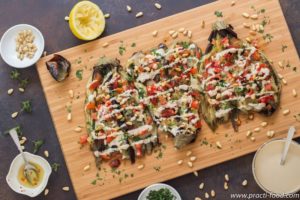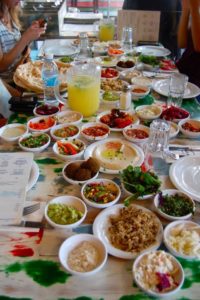Event Reflection by Jessica Horst and Jennifer Kennedy
On Monday, November 13, 2017, the AU Center for Israel Studies hosted famous Israeli chefs both Israeli Jewish and Palestinian, Einat Admony, Lior Lev Sercarz, Michael Solomonov, Osama Dalal, and Tom Franz for their conference, “Israeli Cuisine as a Reflection of Israeli Society.”
Click Here to View a Full List of Event Speakers & Their Biographies.
Israeli cuisine has changed as the country itself has grown and is now one of the hottest culinary trends in the global food industry. Even though hummus and falafel are present in other Middle Eastern cultures as well, they are still thought of as an Israel staple food. Famous chefs and food culture scholars explored the intersection of Israeli cuisine through its history, demographic changes and rich variety of heritage.

In only the last 30 years, Israel has developed a multicultural food scene alongside its technological and economic progress. The foundational years of Israel were filled with poverty, so food was treated only as a basic need. Meals needed to be cheap and easy, and leftovers had to be easily adapted to use for dinner the following day. It wasn’t until young chefs went abroad to study culinary arts to incorporate into Israeli cuisine that new restaurants began to pop up in metropolitan cities. The local mix of hundreds of cultural dishes suddenly expanded to a new fusion of flavors. Soon, Israeli cuisine elicited the stature of gourmet with healthy and sophisticated dishes. The flavors of Israeli cuisine are a homage to those who’ve traveled to perfect their culinary craft.
“Going back to your roots brings a twist to a cuisine you have always been around,” commented chef, author, and restaurateur Einat Admony, so we cook the food we were brought up on. James Beard Foundation 2017 Outstanding Chef and event panelist Michael Solomonov reminisced about his grandmother’s bourekas, baked stuffed pastries, made with margarine, “you can’t add the caring she did, but you can add the butter she couldn’t have.”
 Food as a lifestyle is new to Israelis, but now, “it’s as if they tell you about themselves through food,” stated Solomonov.
Food as a lifestyle is new to Israelis, but now, “it’s as if they tell you about themselves through food,” stated Solomonov.
Food is a topic of conversation in Israel. Each person knows the best hummus spot, and recipe origins. With over a hundred cultural influences, Israeli cuisine has been adapted from many different food types, cooking styles, and often tied to a unique family heritage. The staple dish, “Heirloom Eggplant Carpaccio” or Carppacio Chatsil Baladi, a traditionally charred and peeled or roasted eggplant served with tahini and vegetables, was described as “Israeli bourgeoisie consuming Palestinian heritage,” by Yahil Zaban, who noted that the dish first appeared during the time of the Oslo Peace Accords.
Bakeries are the epicenter of the town during the morning hustle to work for a quick street meal. Whether savory or sweet, around every corner is a place to eat.

Shabbat, the Jewish Sabbath, is celebrated as a day of rest and spiritual reflection from sundown on Friday to sundown on Saturday. Since cooking is considered work during the Sabbath, families must prepare dynamic meals for their Shabbat guests more than twelve hours later. On Friday, local Muslims hold a congregational prayer, Jumu’ah, just after noon instead of their normal Zuhr prayer. Halal ingredients, food that is prepared in accordance with what is permissible or lawful in traditional Islamic law, are purchased around the city to prepare large meals to be celebrated around a table of family and friends.
Food is able to capture culture unlike anything else. Many of the chefs were loathe to define exactly what Israeli Cuisine is. Israelis have the mindset to live in the present and constantly adapt to their surroundings. They take what they get and demonstrate their creativity wish dishes sprinkled with other cultures.
The conference audience gained insight into the dynamics of Israeli cuisine, even if it has yet to be defined. Each chef brought their own common flavor of the cuisine paired with a memorable experience of their childhood, surrounded by food. Food can be the medium for conversation, hospitality, and at times, religion. Though the pairing of food and culture is echoed all over the globe, there was a certain spark of charisma and passion each chef had when describing the new Israeli cuisine.
Despite your roots, you can be inspired by any food and flavor from any culture. There is no language to food, only flavor and experience. Israel is a beautiful melting pot of recipes and heritage.
Click Here to View the Conference Photo Album.
Click Here to View the Event Program.
Jessica Horst
Jess is from New Holland, Pennsylvania and a junior Business Administration major with a personalized specialization and a minor in communications. Jess is the Co-Manager of Student Israelity alongside Sophie Levy, but her primary duty for Student Israelity is website maintenance, management, and design. As Head of Communications at the Center for Israel Studies, Jess has developed her interest in Israel’s agricultural and sustainability practices, as well as population statistics.
Jennifer Kennedy
Jennifer is a student at American University studying public relations and sustainability. Her passions lie in food and the environment. Jennifer is studying to find better means of communication for global issues, including climate change. Food is an intersectional medium for people to discuss and expose cultural plights. Jennifer looks to engage others in discussions about the crossroads of cuisine and climate, hoping to educate, inspire, and push individuals to take action. If not advocating, Jennifer can be found on the field hockey field representing the AU Eagles Club Field Hockey Team, or marketing for our on-campus student-run food publication, Spoon AU.
For any article inquiries, please contact Jessica Horst directly at the email provided: jh5410a@student.american.edu.




